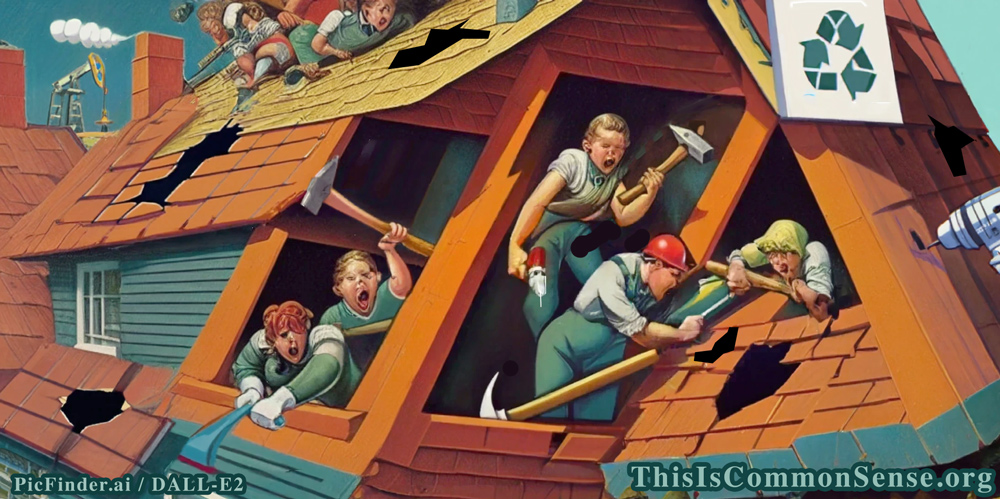Suppose you have a roof. Now you punch holes in the roof. The next time it rains, do the holes help or hurt? You’ve still got a roof, right? Mostly?
Actually, it’s bad to have holes in your roof. And the more holes you have, the worse it gets.
I elaborate this object lesson not primarily for you and your common-sensical friends, but to those determined to make it ever-harder for us to provide ourselves with food, clothing, and shelter by progressively crippling our means of doing so.
Example? The Environmental Protection Agency is trying to kill uninterrupted generation of power in the United States.
New rules the EPA has proposed would require plants powered by coal or gas to eliminate almost all of their carbon emissions by 2040. The plants would have to shut down or switch to less reliable sources of electricity like the sun (unhelpful when it’s cloudy or post-sunset), wind (unhelpful when there’s no wind), and wishful thinking (never helpful).
Fossil-fueled power plants provide some 60 percent of production of electricity in the country. Jim Matheson, head of National Rural Electric Cooperative Associations, warns that the EPA rules would put the reliability of the power grid at risk.
Yes. Rolling blackouts currently the norm in a few states especially plagued by anti-energy policies would become the norm throughout the country.
Like us, proponents of such policies may already know that deliberately creating shortages of energy is bad.
Unlike us, though, they may think that others, and not themselves, will bear the brunt of the downpour.
This is Common Sense. I’m Paul Jacob.
Illustration created with PicFinder.ai and DALL-E2
—
See all recent commentary
(simplified and organized)

4 replies on “Survival Requirements”
It is amazing what happens when people are not in a existential battle for theirs and their families survival. They quickly come to believe survival is not an issue, for themselves and all others, and their making impractical and tested methods of survival mandatory will not be existential for anyone.
Dreams!
Isn’t this all just part of the plan to bring down the United States?
Sorry to see you parroting the “solar and wind are intermittent” bullet point.
All sources of power are intermittent. Turbines break down, lines go down, reactors have to be taken offline, coal trains don’t arrive on time, etc.
With solar and wind, the main way of addressing intermittency is with battery storage — produce more than needed when the sun is bright or the wind is blowing, store it for night-time, cloudy periods, still days. Imperfect. But no more imperfect than anything else.
The problem with solar and wind never has been and is not “intermittency.” Their problems include energy generation density (e.g. much more space is required for solar panels to produce as much as a coal-fired plant) and cost per installed kilowatt-hour.
Fortunately, the US has plenty of space (our population density is lower than Afghanistan’s and much of the desert west is very sunny AND “government-owned” so it’s available for solar farms), and as of 2021, solar got price-competitive with fossil fuels at grid scale.
I’d prefer to see all subsidies eliminated (especially biggest one — oil) and let the market decide. But it’s a near certainty that the the market, in such a case, will lean heavily solar. That’s why the corporate welfare queens in Big Fossil are so whiny.
The use of batteries to address intermittency is far worse than imperfect.
Every serious calculation shows that batteries cannot be produced in sufficient amount. Every serious calculation shows that that, if batteries could be produced in sufficient quantity, the carbon release from that production would exceed the carbon release from alternative energy generation, and the bona fide environmental damage would be worse.